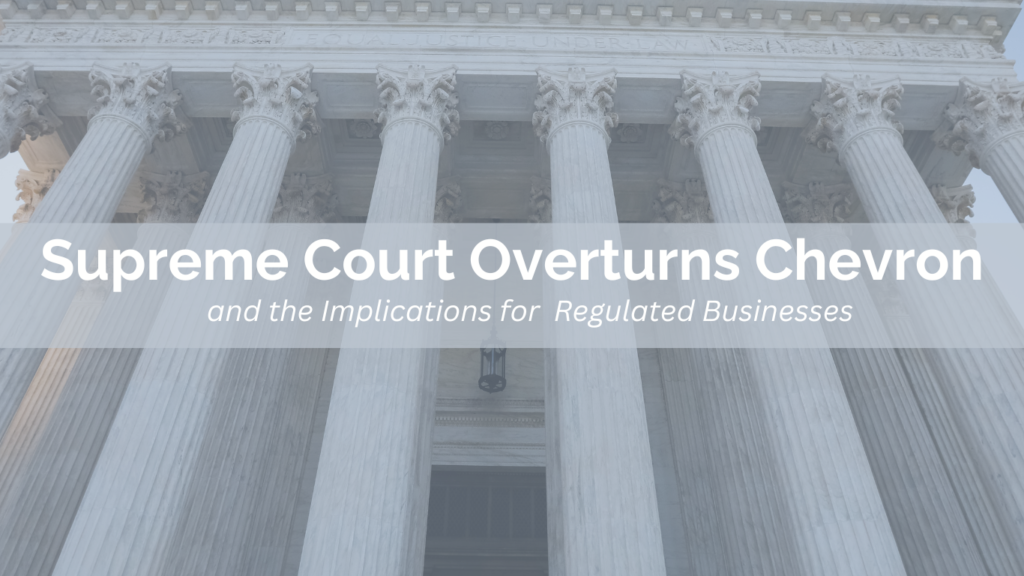For nearly four decades, the United States Supreme Court’s decision in Chevron U.S.A., Inc. v. Natural Resources Defense Council, Inc. has been a cornerstone of administrative law, guiding how courts review federal agency interpretations of statutes. This principle, known as Chevron deference, has profoundly influenced regulatory practices since 1984, but a recent Supreme Court decision in Loper Bright Enterprises v. Raimondo (involving fishing companies in the northeast) significantly altered this landscape, effectively ending the era of Chevron deference. As the title suggests, Chevron deference now “sleeps with the fishes,” a reference for fans of The Godfather, signaling its demise.
The Origins and Function of Chevron Deference
Chevron deference is essentially a two-part test:
- Step One: Judges first examined the statutory language to determine if Congress had directly addressed the precise issue in question. If the statute’s intent was clear, that intent was binding and applied.
- Step Two: If the statute was ambiguous or silent on the issue, the court would defer to the agency’s interpretation as long as it was reasonable and based on a permissible construction of the statute.
Proponents of Chevron deference argued that agencies possess specialized expertise and are better equipped to interpret complex and technical regulations. This deference allowed agencies to fill in legislative gaps and adapt regulations to changing circumstances efficiently. In areas like environmental regulation, health care, and telecommunications, agency expertise has been widely relied upon in interpreting and implementing broad legislative mandates.
The Case of Loper Bright Enterprises v. Raimondo
The Loper Bright Enterprises case arose when several fishing companies challenged a regulation requiring them to pay for government-certified observers aboard their vessels. These observers were tasked with ensuring compliance with applicable federal fishing regulations. The companies argued that this requirement exceeded the statutory authority granted to the agency.
The Supreme Court, in a landmark decision, ruled that the courts should not defer to the agency’s interpretation. Instead, the responsibility of interpreting ambiguous statutes rests solely with the judiciary. This decision marks a significant shift in administrative law, emphasizing and/or re-establishing the judiciary’s role in all things involving statutory interpretation.
Implications of the Supreme Court’s Decision
The implications of the Loper Bright Enterprises decision are profound and far-reaching. For regulated businesses, the immediate impacts might not be apparent, but the long-term effects could be substantial.
- Reduced Agency Authority: Agencies might be less inclined to take action in circumstances where its authority is less clear, as its interpretation of the subject law will no longer be given deference over other interested parties.
- Increased Legal Challenges: Businesses and other regulated entities may feel emboldened to challenge agency regulations more frequently, knowing that courts will not automatically defer to the agency’s expertise. This could result in more litigation, with varying outcomes depending on the judiciary’s interpretation.
- Judicial (in)Consistency: The lack of deference might lead to less consistency in regulatory enforcement. Different judges could interpret the same statutory provisions in different ways, leading to a patchwork of rulings that could create uncertainty for businesses and agencies alike.
- Legislative Clarity: The decision could change how Congress approaches the legislative drafting process, necessitating more precise and detailed statutes. Given how lengthy legislation already is in many cases, it will be challenging for lawmakers to anticipate all potential scenarios that might arise during the implementation of a given law.
Need Assistance?
At Momentus Legal, we work with numerous regulated businesses that might be affected by this decision.If you have questions about how this decision might impact you or your business, please reach out to us at info@momentuslegal.com. Our team at Momentus Legal is here to help you understand and respond to these changes effectively.





